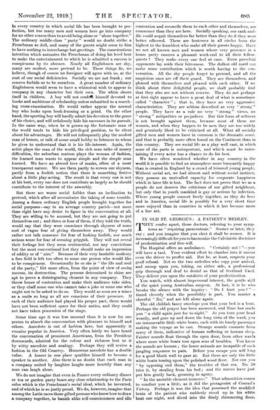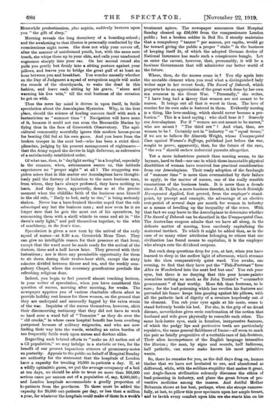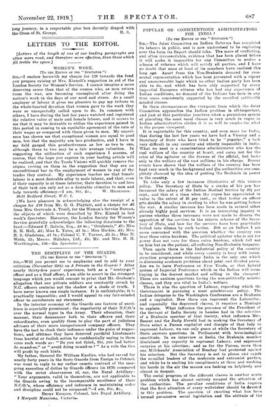IN OLD ST. GEORGE'S : A PATIENT'S MEDLEY.
THEY confer apart, those doctors, referring to your symptoms as " requiring paracentesis." Sooner or later, they say ; and you imagine that you elect it shall be sooner. It is increasingly difficult foryou to harmonize the Calvinistic doctrines of predestination and free-will.
The Hospital offers an ambulance. " Certainly not ! "—you will have a taxi. Your evident effort to clamber into it moves even the driver to proffer aid. But he, at least, respects your gruff refusal. Not so the two orderlies who espy your arrival, and swoop upon you, taking, on either side, a professional grip thorough and deaf to denial as that of Scotland Yard. They deliver you upon the outskirts of your predestination.
You watch, with almost impersonal interest, the gentle sldll of the quiet young Australian surgeon. At last, it is he who breaks the silence with the inquiry : " Do I hurt you "— timed cleverly when the possibility is past. You muster a cheerful " No," and are left alone again: The old childish fancy envelops you that your bed is a boat. Perhaps the old prayer has been answered, and Time has made you " a child again just for to-night." As you turn your head wearily, and gaze up and down the long vista of the ward, you see innumerable little white boats, each with its lonely passenger making the voyage as he can. Strange sounds emanate front many of them, indicative of human suffering or human sleep. Fainter sounds float through the open door, from other wards where more white boats toss upon seas of troubles. You know the sounds are human ; the lower animals are incapable of such jangling responses to pain. Before you escape you will long for a good blank wall to gaze at. But there are only the little white boats tossing upon the polished wood floor. Nor can you " by opposing end them," the troubles of that sea. No. 20 tries it, by stealing from his bed ; and the nurses have just put him gently back, groaning in agony.
" In the unstable element immerse." That admonition comes to comfort you a little, as it did the protagonist of Conrad's Victory. Perhaps it was the idea that possessed the muddled brain of the patient who suddenly stood up in his white boat one night, and dived into the dimly shimmering floor.
Meanwhile predestination, plus aspirin, suddenly bestows upon you " the gift of sleep."
Morning reveals the long dormitory of a boarding-school ; and the awakening to that illusion is personally conducted by the conscientious night nurse. She does not whip your covers off, after the manner of uninformed youth, but, with the same sure touch, she whips them up to your chin, and calls your unadorned cognomen sharply into your ear. On her second round she pulls you gently but firmly into a sitting posture against your pillows, and leaves you to bridge the great gulf of at least an hour between you and breakfast. You wonder uneasily whether on the Day of Judgment a squad of scrupulous angels will make the rounds of the churchyards, to wake the dead in this fashion, and leave each sitting by his grave, " alone and warming his five wits," till the real business of the occasion be got on with.
Thus the mere lay mind is driven in upon itself, in futile speculation about the Aeseulapian Mysteries. Why, in the first place, should the science of healing concern itself with such a fantasticism as " summer time " ? Navigation will have none of it, because it could not run even the Mercantile Marine by flying thus in the face of Greenwich Observatory. The agricultural community scornfully ignore this modem hocus-pocus for beating Old Sol at his own game. And you learn from the broken trooper in the next bed—who has been a strict disciplinarian, judging by his present management of nightmares— that the Army regard the device in high disfavour, as subversive of a satisfactorily established order.
Of what use, then, is " daylight saving " in a hospital, especially fn the summer, when, astronomers assure us, this latitude experiences no " proper night " at all ? The staggering suspicion arises that in this matter our Aesculapians have thoughtlessly paid the flattery of imitation to the mere business man, from whom, they have always professed, they have nothing to learn. And they have, apparently, done so at the precise moment when the childlike faith of the business man himself in the old rule, " Early to bed, early to rise," is being seriously shaken. Never has a hare-brained theorist urged that the rule advantaged any but the business man ; and now even he is no longer sure that he gets the most out of his operatives, by summoning them with a shrill whistle to come and sit in " the dawn's early light," and pull themselves together, to the whir of machinery, in the firm's time.
Speculation is given a new turn by the arrival of the early squad of nurses—at 5.30 a.m. Greenwich Mean Time. They can give no intelligible reason for their presence at that hour, except that the ward must be made ready for the arrival of the doctors, three and a half hours later. They proceed with their lustrations ; nor is there any permissible opportunity for them to sit down during their twelve-hour shift, except the sixty minutes divided between dinner and tea, and the weekly oompulsory Chapel, where the necessary genuflexions preclude the refreshing religious doze.
Indeed, you begin to feel yourself almost touching bottom, in your welter of speculation, when you have considered this question of nurses, morning after morning, for weeks. The newspaper apprises you of various charitable efforts afoot to provide holiday rest homes for these women, on the ground that they are underpaid and unusually fagged by the extra strain of the war. Inquiries of the nurses themselves, however, elicit their disconcerting testimony that they did not have to work so hard over a ward full of " Tommies " as they do over the " old crocks," in whose cases hospital benefit has been overlong postponed because of military exigencies, and who are now finding their way into the wards, entailing an extra burden of too frequently futile work upon nurses and doctors alike.
Regarding such belated efforts to "make an Al nation out of a C3 population," we may indulge in a statistic or two, for the benefit of our present loquacious utterers of promissory-notes on posterity. Appeals to the public on behalf of Hospital Sunday are authority for the statement that the hospitals of London have a capacity for treating l0,000 in-patients a day. If, at a wildly optimistic guess, we put the average occupancy of a bed at ten days, we should be able to treat no more than 365,000 serious cases per annum out of a population of, say, 8,000,000 ; and London hospitals accommodate a goodly proportion of in-patients from the provinces. To these must be added the capacity for 20,000 out-patients per day, or less than a million a year, for whatever the hospitals could make of them in a week's treatment apiece. The newspaper announces that Hospital Sunday cleaned up £56,000 from the compassionate London public ; but a broken soldier in Bed No. 3 stoutly maintains that a compulsory " tanner " per annum, per capita, would go far toward giving the public a proper " stake " in the business of keeping itself fit, of which the adopted German device of National Insurance has made such a conspicuous bungle. Let us enter the caveat, however, that, presumably, it will be a business Government that will administer our better world of the future.
Where, then, do the nurses come in ? You slip again into the unstable element when you read what a distinguished lady writer says in her recent book, The Sword of Deborah, which purports to be an appreciation of the great work done by her own sex overseas in the Great War. " Personally," she writes, " I have long had a *eery that women are not meant to be nurses. It brings out all that is worst in them. The love of routine for its own sake is fostered in them. Evidently nursing is a thing, like love-making, which should never become a profession." This is a hard saying : who shall hear it ? Scarcely our Aesculapians. For if " women are not meant to be nurses," who are meant ? "The third sex" ? And what, then, are women to be ? Certainly not in " industry " on " equal terms," if we are to believe Sir Almroth Wright, whose Unexpurgated Case against Woman's Suffrage, published just before the war, sought to prove, apparently, that, for the future of the race, " the sex " should eschew industrial pursuits altogether.
Yet a more industrious pursuit than nursing seems, to the layman, hard to find—nor one in which those immutable physical disabilities of woman have received less practical consideration from our Aesculapians. Their ready adoption of the fandangle of " summer time" is more than overmatched by their failure to apply, in the matter of nurses, one of the really sensible emanations of the business brain. It is more than a decade since J. H. Taylor, a mere business theorist, in his book Scientific Management Applied, first proved, from the employer's standpoint, by precept and example, the advantage of an elective rest-period of several days per month for women in industry as a means of levelling up the inequality of the sexes. With that fact we may leave to the Aesculapians to determine whether The Sword of Deborah can be sheathed in the Unexpurgated Case. The Australian surgeon admits that we have all along, in the delicate matter of nursing, been carelessly capitalising the maternal instinct. To which it might be added that, as in the case of so many other attributes belonging to others that our civilization has found means to capitalize, it is the employer who always cuts the dividend coupons.
But such deep questions drop for you, at last, when you have learned to sleep in the mellow light of afternoon, which streams into the then comparatively quiet ward. You awake, one evening, to find that they have put the "Fish-Footman" from Alice in Wonderland into the next bed but one You rub your eyes, but there is no denying that this poor house-painter resembles nothing so much as Sir John Tenniel's " counterfeit presentment " of that worthy. More fish than footman, to be sure ; for the lead-poisoning which has swollen his features and pervaded his frame keeps him gasping against his pillows, with all the pathetic lack of dignity of a creature hopelessly out of its element. You rub your eyes again at his mate, come tc stand forlornly beside his bed. For she, in the grip of no dread disease, nevertheless gives eerie confirmation Of the notion that husband and wife grow physically to resemble each other. The same lack-lustre eyes, sunk in formless, inexpressive features, of which the pudgy lips and protrusive teeth are particularly repulsive, the same general flabbiness of frame—all seem to mark the pair as fatally progenitive of a veritable race of fish-footmen. Their alien incompetence of the English language intensifies the illusion ; the man, by signs and sounds, half ludicrous, half pathetic, can scarce make known his most primitive wants.
So, there he remains for you, as the dull days drag on, human timber that we have not hesitated to use, and abandoned as driftwood, while, with the sublime stupidity that makes it great, our Anglo-Saxon civilization solemnly discusses the ethics of lead-poisoning in industry, and plans the great future of preventive medicine among the masses. And dutiful Mother Britannia shows at her best, perhaps, when she stoops remorsefully, at last, to pillow this poor specimen upon her ample breast, and to lavish every comfort upon him ere she starts him on his
long journey, in a respectable pine box decently draped with the Cross of St. George. R. S.








































 Previous page
Previous page